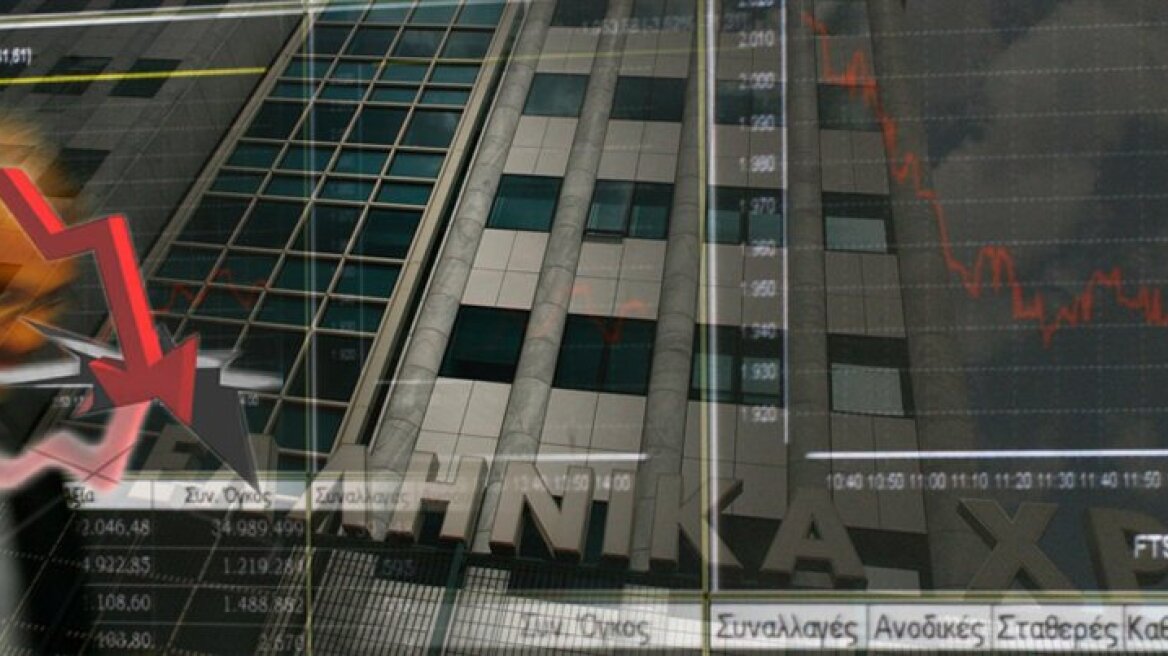
The seven plagues that bring new lows at the ASE
The seven plagues that bring new lows at the ASE
The sharp decline of the Athens Stock Exchange anticipates the banks’ entry into the emergency liquidity fund (ELA) and their nationalization.

UPD:
The sharp decline of the Athens Stock Exchange anticipates the banks’ entry into the emergency liquidity fund (ELA) and their nationalization.
The Index dropped to unprecedented low levels, reaching 911,07 points which, in fact, is the lowest level in the last 15 years.
But the new lows are not as important now as the fact that banks are not financing the economy. They are just refinancing old loans, "until they blow up", as eloquently put by an authoritative broker.
Why is it then that the decline in the stock market is unstoppable, a few days before the banks respond (9 September) on the process of bond exchange?
Essentially, we are dealing with seven plagues:
1) The stock market deals mainly with banks, something that was highlighted by market members when banks absorbed the investment companies. So, the Index has 7 banks out of a total of 20 companies and it is natural for it to be attacked every day, especially when approaching the process of bond exchange.
The Index dropped to unprecedented low levels, reaching 911,07 points which, in fact, is the lowest level in the last 15 years.
But the new lows are not as important now as the fact that banks are not financing the economy. They are just refinancing old loans, "until they blow up", as eloquently put by an authoritative broker.
Why is it then that the decline in the stock market is unstoppable, a few days before the banks respond (9 September) on the process of bond exchange?
Essentially, we are dealing with seven plagues:
1) The stock market deals mainly with banks, something that was highlighted by market members when banks absorbed the investment companies. So, the Index has 7 banks out of a total of 20 companies and it is natural for it to be attacked every day, especially when approaching the process of bond exchange.
2) As stated by a broker, it is impossible for the banking system to remain intact since the country has been on the brink of bankruptcy and been saved by foreign money. Essentially, at the current levels, the stock market anticipates the entry of banks into the fund, which was considered normal for the Troika.
3) The problem of the banks was not caused by them, but it became worse due to them. Even since January 2010, a state broker had supported Greek banker bonds because they were the bank's asset.
Administrations are responsible for increasing the positions, as well as for the fact that they bought the bonds from the state at 5%, borrowed at 1% from the ECB and made a 4% profit until the debt exploded when the current government started touring around saying the country is bankrupt.
4) The Greek market lacks Greek institutional investors, as they are connected to banks. Mutual funds and IDPs have limited capacity. Greek owners do not have money because they have lost fortunes since October 2009, while insurance funds are nonexistent. They cannot sell or buy shares, nor do any trading. Mostly, however, they cannot pay the pensions.
5) Foreign institutional investors have left Greece, and those who are watching from abroad are not interested in voicing their opinion.
6) They say values show the truth. The National’s assessment shows it is now cheaper than its Turkish subsidiary, which could be sold for about 4 billion euros. So, in this case, how much does the remaining National Bank cost? 1 billion maybe? Of course not!
7) Foreigners such as Pimco and S&P are not interested in Greece, but mainly in what Merkel will reply to them.
So when Pimco’s El Arian talks about two speeds, he wants to test the response of the German Chancellor. Unfortunately for us, foreigners are not interested unless we reduce our deficit.
The bill for Greece is 100 billion for Germany - France, a very small part of Germany’s debt, which is higher than 1,3 trillion.
The check could have been written in one night, but first they want to see results and obtain assets of great value.
Above all, however, Greek banks have to finance the Greek economy when the state receives some money.
3) The problem of the banks was not caused by them, but it became worse due to them. Even since January 2010, a state broker had supported Greek banker bonds because they were the bank's asset.
Administrations are responsible for increasing the positions, as well as for the fact that they bought the bonds from the state at 5%, borrowed at 1% from the ECB and made a 4% profit until the debt exploded when the current government started touring around saying the country is bankrupt.
4) The Greek market lacks Greek institutional investors, as they are connected to banks. Mutual funds and IDPs have limited capacity. Greek owners do not have money because they have lost fortunes since October 2009, while insurance funds are nonexistent. They cannot sell or buy shares, nor do any trading. Mostly, however, they cannot pay the pensions.
5) Foreign institutional investors have left Greece, and those who are watching from abroad are not interested in voicing their opinion.
6) They say values show the truth. The National’s assessment shows it is now cheaper than its Turkish subsidiary, which could be sold for about 4 billion euros. So, in this case, how much does the remaining National Bank cost? 1 billion maybe? Of course not!
7) Foreigners such as Pimco and S&P are not interested in Greece, but mainly in what Merkel will reply to them.
So when Pimco’s El Arian talks about two speeds, he wants to test the response of the German Chancellor. Unfortunately for us, foreigners are not interested unless we reduce our deficit.
The bill for Greece is 100 billion for Germany - France, a very small part of Germany’s debt, which is higher than 1,3 trillion.
The check could have been written in one night, but first they want to see results and obtain assets of great value.
Above all, however, Greek banks have to finance the Greek economy when the state receives some money.
UPD:
Ακολουθήστε το protothema.gr στο Google News και μάθετε πρώτοι όλες τις ειδήσεις
Δείτε όλες τις τελευταίες Ειδήσεις από την Ελλάδα και τον Κόσμο, τη στιγμή που συμβαίνουν, στο Protothema.gr
Δείτε όλες τις τελευταίες Ειδήσεις από την Ελλάδα και τον Κόσμο, τη στιγμή που συμβαίνουν, στο Protothema.gr
ΡΟΗ ΕΙΔΗΣΕΩΝ
Ειδήσεις
Δημοφιλή
Σχολιασμένα






































